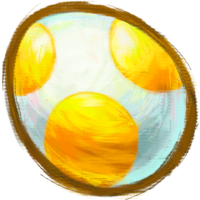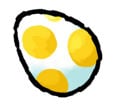Yellow Egg: Difference between revisions
From the Super Mario Wiki, the Mario encyclopedia
Jump to navigationJump to search
No edit summary Tag: Mobile edit |
mNo edit summary |
||
| Line 13: | Line 13: | ||
Yoshi-scene1.png|''Yoshi's Island: Super Mario Advance 3'' | Yoshi-scene1.png|''Yoshi's Island: Super Mario Advance 3'' | ||
YIDS_YellowEgg.jpg|''[[Yoshi's Island DS]]'' | YIDS_YellowEgg.jpg|''[[Yoshi's Island DS]]'' | ||
YIDS Yellow Egg.png|''Yoshi's | YIDS Yellow Egg.png|''Yoshi's Island DS'' | ||
YNI Yellow Egg.png|''[[Yoshi's New Island]]'' | YNI Yellow Egg.png|''[[Yoshi's New Island]]'' | ||
</gallery> | </gallery> | ||
Revision as of 22:21, May 16, 2023
- This article is about a yellow variant of Yoshi's Egg after it recoils once off walls, from the Yoshi's Island series of games. For generic instances of yellow Yoshi Eggs, see Yoshi's Egg.
| Yellow Egg | |
|---|---|

| |
| First appearance | Super Mario World 2: Yoshi's Island (1995) |
| Latest appearance | Yoshi's Crafted World (2019) |
A Yellow Egg[1][2] (also parsed as yellow egg)[3] is a type of Yoshi's Egg found in Super Mario World 2: Yoshi's Island (and its reissue), Yoshi's Island DS, Yoshi's New Island, and Yoshi's Crafted World. Yellow Eggs are used as throwable objects. When a Yellow Egg hits an enemy, it drops one coin. Yellow Eggs can be acquired if a Yoshi throws a Green Egg that recoils once from the wall, then catches it; if the Yellow Egg recoils once more, it turns red. Yellow Eggs can also be obtained from yellow-spotted Egg Blocks, though unlike with a green-spotted Egg Block, a Yoshi gets only one egg.
Gallery
Names in other languages
| Language | Name | Meaning |
|---|---|---|
| Japanese | 黄色のタマゴ[4] Kiiro no Tamago |
Yellow Egg |
| Chinese | 黄蛋 Huáng Dàn |
Yellow Egg |





